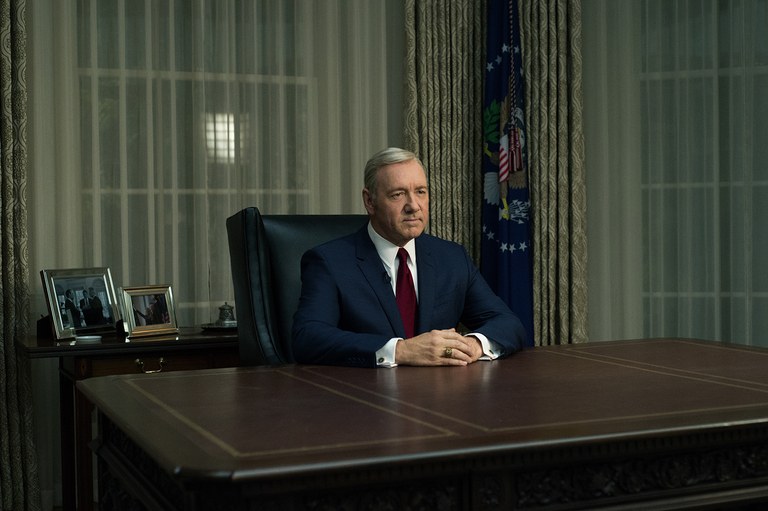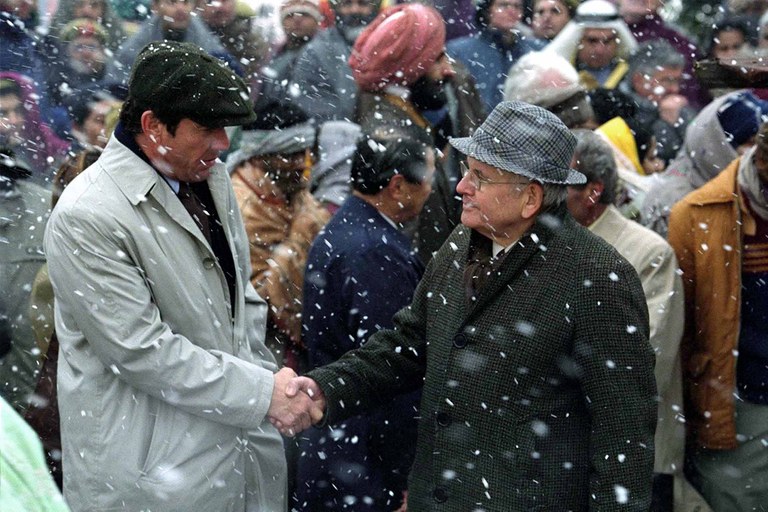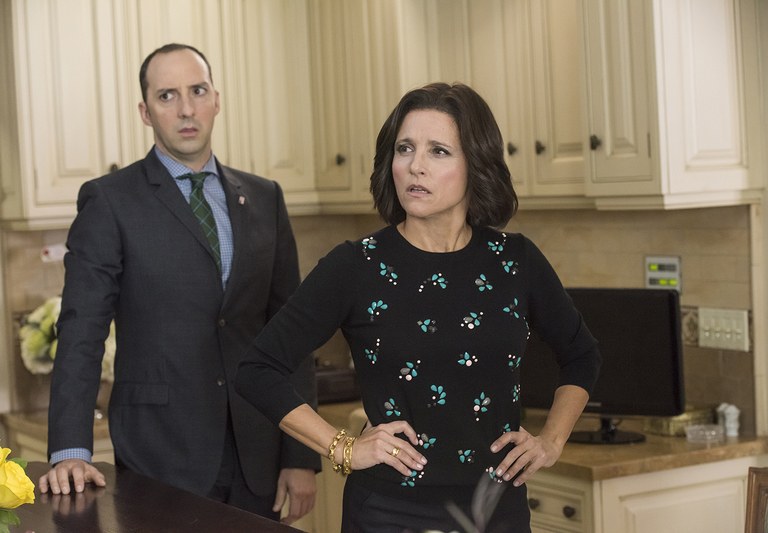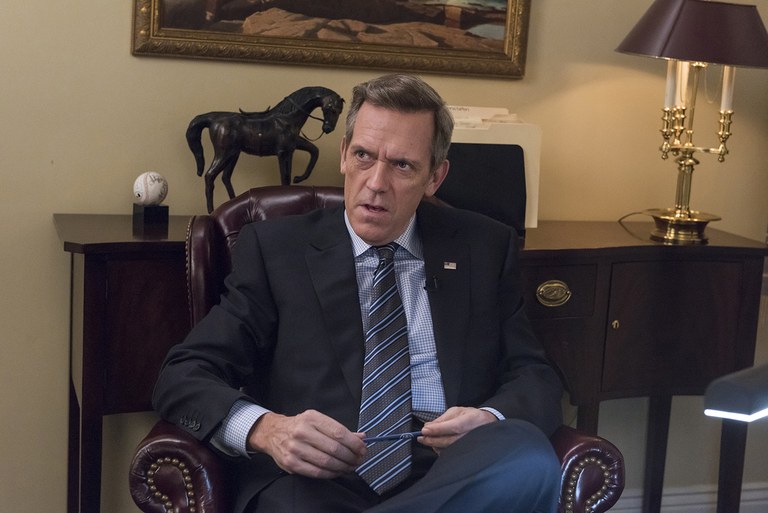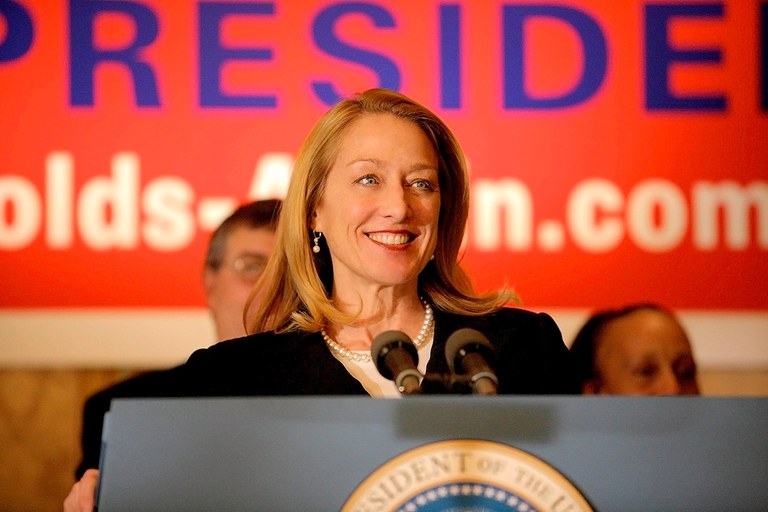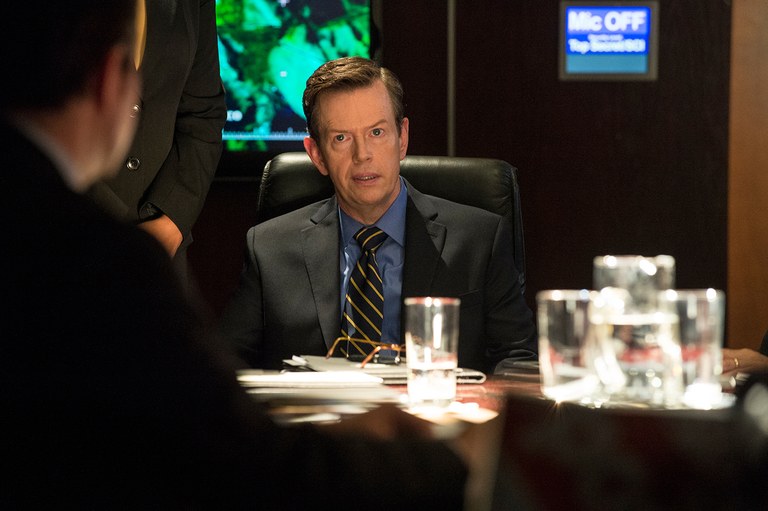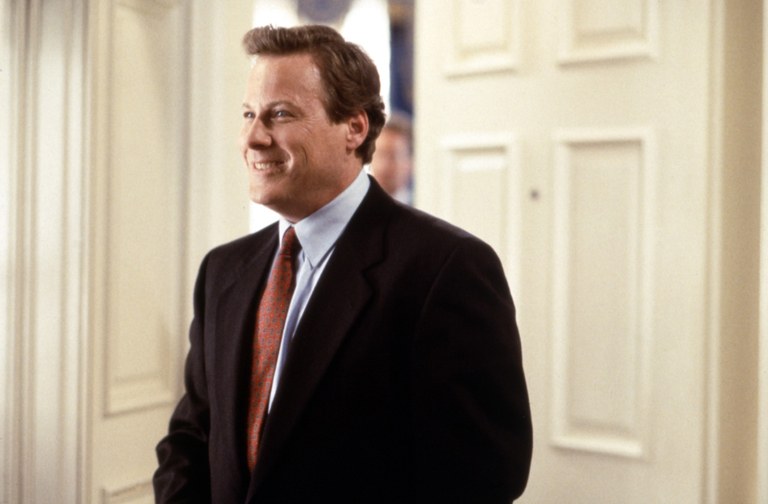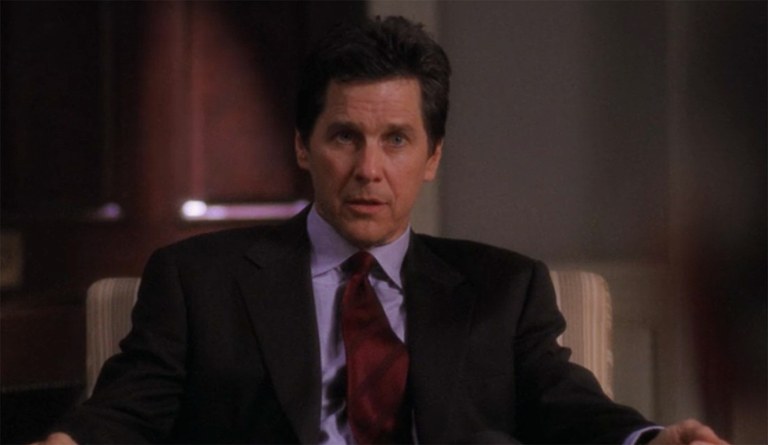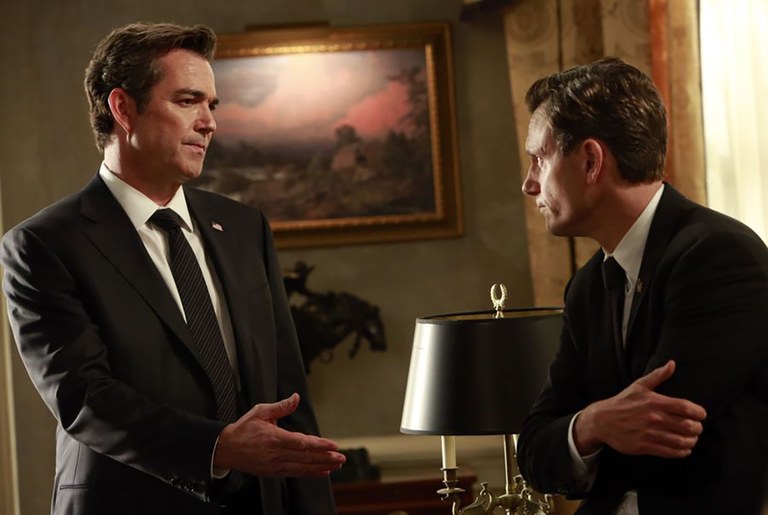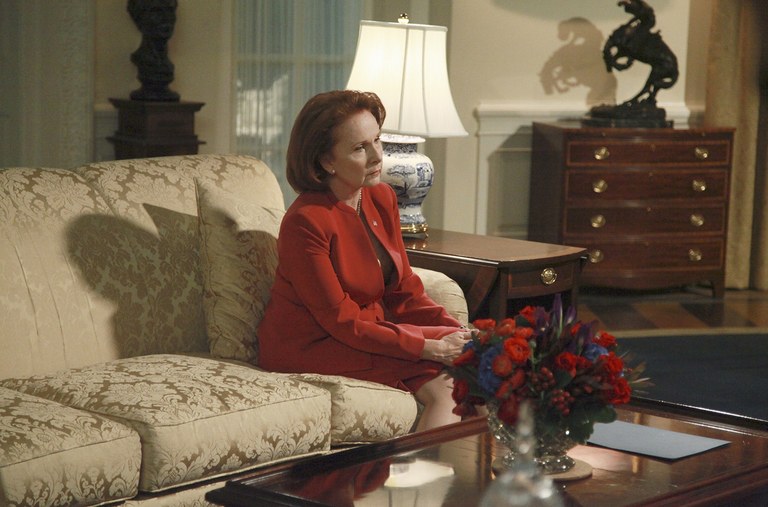Did you see the show about the mad queen last night? No, I’m not talking about Game of Thrones—I’m talking about Veep, starring Julia Louis-Dreyfus as egotistical, amoral presidential wannabe Selina Meyer. The comedy’s series finale maintained the same tone as the rest of its idiosyncratic final season, dispensing with easy punch lines for a bitter, cynical finish—one that gave Selina everything she wanted, at the cost of everything that made her human.
Veep doesn’t put too fine a point on its tragic ending—but it’s evident in the crushed, empty look on Selina’s face as she surveys the Oval Office she now inhabits, and in the faces of those she handily disposed of along the way—particularly faithful Gary (Tony Hale), who unwittingly takes the fall for her financial misdeeds. The finale’s last scenes jump 24 years into the future, both to show us what’s become of each major character and to delicately demonstrate just how pointless Selina’s efforts to secure her legacy were. Her careful funeral guest-list directions are ultimately ignored; her only significant policy act is “permanently overturning” same-sex marriage. And in a reference to the show’s premiere episode, the TV coverage of her funeral winds up being pre-empted by the death of beloved actor Tom Hanks—the celebrated star, according to the show, of Philadelphia and “Philadelphia 2.”
It’s a ruthless comeuppance for a woman entirely obsessed with her image—one that not only was seeded in the show’s beginnings, but also evolved to meet the chaotic new norms of the Donald Trump era. Veep’s creator, Armando Iannucci, is a Scotsman; after Season 4, he left the show in the hands of American David Mandel, who wrote and directed the finale. Politics has become quite a different sphere since Veep launched in the thick of the Obama era; at first, it seemed a dry, repressed series like this couldn’t find a way to satirize the new world order. In a column published at the end of April, Variety’s Daniel D’Addario argued just that, charging that the Trump era had “wrecked” Veep, transforming it from a show about “the low-level scheming of a painfully ineffectual public servant” to one that followed “an abusive sociopath aided and abetted by a pack of scoundrels.”
I disagree. This trajectory was built into the show from its very beginning; Veep’s characters became jaded husks after years of insulation within an elite political class. Selina started the show anxious for validation, surrounding herself with people who aided and abetted her every need—nodding along to her profanities, encouraging her underhanded tactics, and reinforcing the primacy of political victory over moral righteousness. Consider the Season 3 episode “The Choice,” in which Selina’s entire staff is tasked with finding the most politically expedient stance on abortion (spoiler alert: there isn’t one)—or the Season 1 episode “Nicknames,” where Selina has a chance to force a vote on her pet cause, but lets the opportunity pass her by for the sake of political expediency. From the start, Selina has chosen political gain over her so-called beliefs, and as the show adroitly demonstrates, the entire political system rewards her for it.
Veep’s final season is not a sudden left turn. It’s a sharp referendum that refuses to assuage our anxieties by assuring us that Trump is a one-off—as, for example, candidate Joe Biden has insisted. The show makes a staggering case for how this competitive, insular environment breeds monsters: Jonah (Timothy Simons) repulses Amy (Anna Chlumsky), but his polling success injects her with the glee of victory. Kent (Gary Cole) and Ben (Kevin Dunn) help Selina un-free Tibet, order a drone strike on a wedding, and steal a primary election with the help of Chinese interference. Gary, a hapless fool, attends to Selina when she has an affair with a Sudanese warlord and takes refuge in the Finnish asylum for crimes against humanity. The problem is not one bad apple; it’s that a tree like this can only grow bad apples.
The brilliance of this final season is that Veep’s twist—its amoral center—was inside the show all along. We always knew these characters had no principles, but up until the final few seasons, they were kept far enough away from power that they mostly chased their own tails. By Season 7, their reach has gotten so long—and their cynicism so staggering—that the show has to kneecap its own dire stakes just to keep the proceedings from getting too dark.
Veep deliberately feints, more than once, toward real, textual tragedy—Selina’s horrible, accidental execution of her ex-husband, Andrew (David Pasquesi), or Amy’s suspicion that Jonah’s wife/half sister, Beth (Emily Pendergast), is pregnant with their terribly incestuous child. Yet Beth isn’t pregnant; she’s just addicted to opiates. And Andrew winds up being visible on the streets of Oslo and at Selina’s funeral, suggesting this slippery fellow escaped even a Chinese bomb. Still, the suggestion of catastrophe is enough to make the horror real in the audience’s mind—and so even as the story pulls back from intimate violence and incest, its characters’ charade of normalcy is no longer tenable. We reach a point at which their behavior and actions aren’t funny anymore, which is the point.
By then, though, it’s too late. Louis-Dreyfus fabulously nudges Selina’s worst impulses to the edge; her need to be seen as presidential, whatever that means, turns her into a gaping maw that consumes everything in her path.
In many ways, Sunday night’s Game of Thrones tried to pull off the same trick—but where Veep succeeded, the drama failed, spectacularly. “The Bells” depicted the sacking of King’s Landing, led by Daenerys Targaryen (Emilia Clarke) on her one remaining dragon. She scorches the city’s defenses to ruin; at a heavily telegraphed moment, the bells of the city start ringing, indicating surrender. All Dany must do is find Cersei (Lena Headey), and her victory is assured. The camera closes up on each major character’s face, prolonging the moment where the tide has officially turned—and then Dany and her dragon set the streets ablaze anyway, murdering thousands of innocents in a conflagration that appears to destroy most of King’s Landing.
It’s an abrupt heel-turn for a character who has long cloaked herself in the righteousness of protecting the innocent and freeing the enslaved. My colleague Joanna Robinson expertly broke down the clues that led to this moment, while also explaining the negative reaction many viewers, including myself, had to the development. Our main complaint: so many character arcs have been shortchanged in Game of Thrones’ quick, compressed conclusion that our beloved heroes have rapidly become unrecognizable.
To be sure, Game of Thrones has always been a show cynical about power and those who wield it. There has also long been much to critique in Daenerys’s brand of imperial feminism, which upholds equality so long as it doesn’t threaten her absolute power. The issue with this story line is not that Dany became evil (or, in the series’s problematic parlance, “mad”), but rather that this turn was poorly executed.
We have known Daenerys for almost a decade, since Game of Thrones debuted in 2011. She’s always been both Mad King Aerys’s daughter and the sane Targaryen heir, compared to her unstable, cruel brother Viserys (Harry Lloyd). She was a child bride raped on her wedding night; as a result, she used her position to force her tribe to cease their rampant raping. She risked—and lost—her livelihood in an effort to save Mirri Maz Duur (Mia Soteriou) from Khal Drogo’s (Jason Momoa) bloodriders. She chained her dragons in a dungeon in Meereen when they killed a child. She built her devoted following by extending mercy to the Unsullied and freeing slaves.
We have seen her do cruel things, yes, such as crucifying the slave owners in Meereen. But we’ve also seen Cersei blow up a church, Tyrion strangle the prostitute he took as a lover, Arya’s numerous murders, Jaime’s crippling of Bran, and dozens, if not hundreds, more anonymous rapes, murders, maimings, and massacres throughout the show’s eight seasons on air. Dany’s cruelty was shocking, but it existed within a world where badass expressions of grand power are lauded—and sometimes strategically necessary. And her impulsive, violent actions were often faced with thorny consequences. She could never quite maintain her grip on Meereen; ultimately, her departure from that city was as much an admission of that as it was a tactical move to conquer Westeros.
Most importantly, we have for eight seasons watched Dany be a woman who tries to be a good ruler. She attempts justice; she takes risks for her vision of righteousness. She has compassion for the downtrodden. The death of her close adviser and friend Missandei (Nathalie Emmanuel) was contrived to anger and devastate her. Daenerys is capable of love; we’ve seen her love Drogo, Daario, and Jon Snow. She’s capable of mercy. She’s capable of discussing what it means to govern. In sharp contrast to Selina Meyer, she cares—and again unlike that of Veep, the audience of Thrones knows she cares. In television’s best-case scenario, character arcs span years; viewers come to live with the people they watch, to identify with them and learn with them. Over nearly 10 years, we have rooted for Dany’s goodness, even as we have condemned her cruelty and her idiocy.
As of Sunday, Game of Thrones wants us to believe that Dany went off the deep end, perhaps due to her Targaryen blood. Sure, it’s possible she had some kind of Targaryen-specific psychotic break; yes, one can comb through this episode to find its triggers (grief, loss, anger). But that’s not a story—that’s an equation. It’s not a journey that tells us something about our shared humanity; it’s an unsatisfying bait-and-switch that nullifies eight seasons of character work, rendering them meaningless. (If Daenerys was just going to go “crazy” at some point, why did we spend so much time in Meereen?!)
What Thrones did on Sunday is the opposite of “show, don’t tell.” It pushed the viewer out of the narrative at the exact moment the audience needed to be as keyed into Dany’s decision as possible. The series has had plenty of time to show us why Dany might have snapped—whether that’s in mourning her two dead dragons and Missandei, or nursing the wounds of her early sexual assault, or ruminating over Mirri Maz Duur’s betrayals, or imagining a scorched landscape of bloody victory. Instead, her decision came suddenly, and largely without explanation. We don’t even get a good look at her face after she realizes what she’s done to King’s Landing; the show withdraws from Daenerys’s interior life to emphasize the havoc she’s wreaking below. It’s brutally effective, from Arya’s (Maisie Williams) perspective on the streets, in showing how the acts of a distant tyrant affect the most vulnerable. But it’s also as if the show has abandoned Daenerys’s inner life, at the moment of her most crucial act.
Veep knows its protagonist is bad—but by the end, it shows more compassion to Selina than Game of Thrones shows Daenerys. Selina may be awful, but she’s also a product of an awful system—and briefly, at the end, you see that realization in her eyes. Dany, apparently, is the proverbial bad apple; she has nothing to blame, in this violent and awful world, but her genes. By the end of Sunday’s episode, we have no idea who this person is anymore; the window we have had into her decisions has disappeared.
True, Game of Thrones is critiquing absolute power and warfare; that’s sharp, crucial work. But it has also sacrificed a woman’s entire character arc in the process. (Cersei—the other queen—was, of course, evil and insane herself even before Daenerys went on her rampage.)
So, yes: there were two shows about mad queens on HBO last night. Both flirted with murder and incest; both grappled with the corrupting weight of power. But only one let the woman at its center be a whole character, from desperation and vulnerability to ambition and cruelty.




















![[Book Review] The Blade Itself (The First Law Trilogy) by Joe Abercrombie](https://bendthekneegot.com/wp-content/uploads/2018/01/1516047103_maxresdefault-218x150.jpg)







